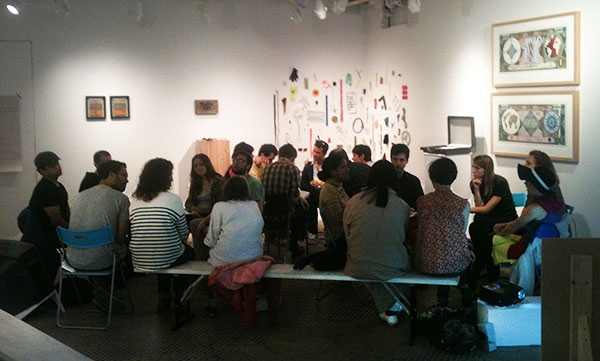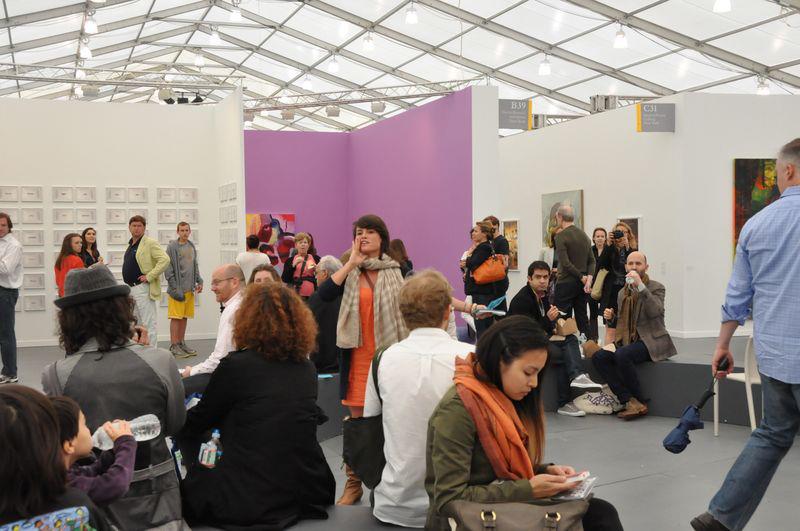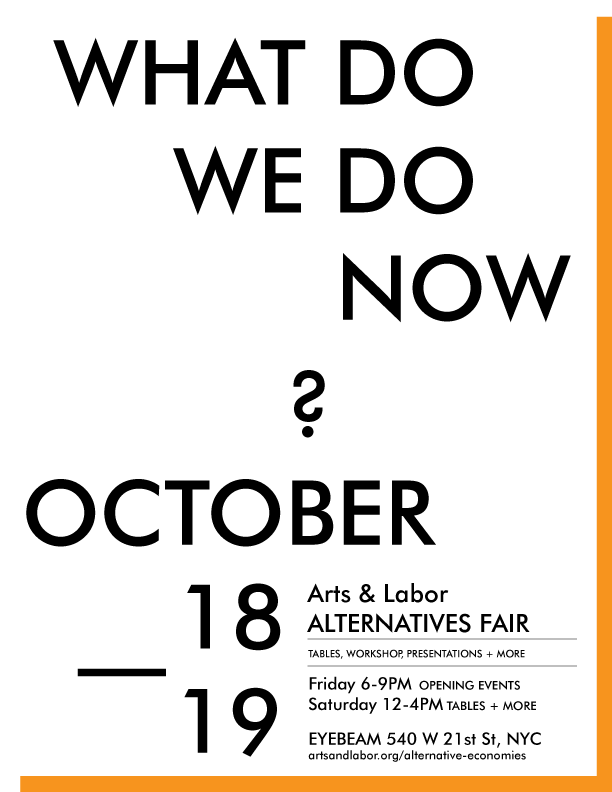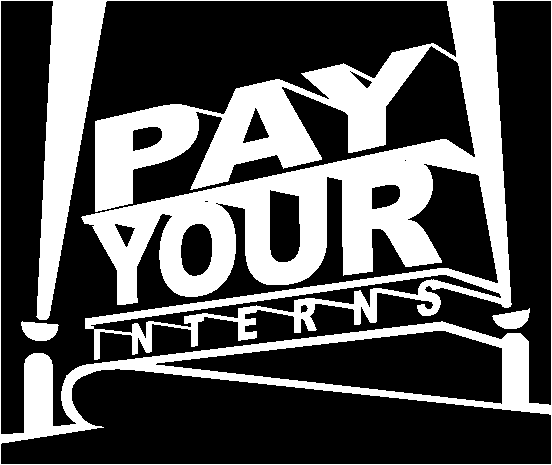We have gotten word that the Frieze NY Art Fair has began negotiations with Teamsters Joint Council 16, IATSE Local 829, IATSE Local 1 and District Council 9 of Painters around hiring union contractors to construct its 200,000 square foot tent on Randall’s Island.
Organizing for Frieze NY 2014
 It’s that time of year again. The great white spaceship of an art fair, Frieze NY, prepares for its descent on Randall’s Island, bringing with it some of the biggest galleries and richest collectors from around the world.
It’s that time of year again. The great white spaceship of an art fair, Frieze NY, prepares for its descent on Randall’s Island, bringing with it some of the biggest galleries and richest collectors from around the world.
Last year, Arts & Labor launched a campaign in solidarity with Teamsters Joint Council 16, IATSE Local 829, IATSE Local 1 and District Council 9 of Painters to demand that Frieze hire union and local labor in the construction of its tent. We continue to organize as a coalition around these demands.
In 2014, Arts & Labor will continue to advocate for union jobs and against exploitative conditions for all art workers at the fair. Arts & Labor also demands that Frieze NY, a multimillion dollar operation held in a public park, support the surrounding neighborhood-based arts communities.
SOME FACTS ABOUT FRIEZE & RANDALL’S ISLAND
• Last year Frieze hired the company Production Glue to construct its massive tent. Production Glue refused to hire local and union, and instead brought in workers from as far away as Wisconsin, paying them a fraction of the wages that NYC workers receive.
• Frieze takes place on public park land and pays less than $1/square foot (this may be the cheapest rent in all of NYC)
• Frieze is inaccessible for many New Yorkers with its ticket prices of $44/person.
• Randall’s Island is managed by a public-private partnership called the “Randall’s Island Park Alliance” (RIPA)
• There is a longstanding fight against privatization and to keep Randall’s Island accessible to the surrounding neighborhoods of East Harlem and the South Bronx. There is a comprehensive of this history on East Harlem Preservation’s website.
Arts & Labor 2013 Actions
April 17, 2013: Arts & Labor issues a statement of support to Teamsters Joint Council 16, IATSE Local 829, IATSE Local 1 and District Council 9 of Painters to demand that Frieze hire union and local labor.
May 1, 2013: Arts & Labor storms the Frieze office on Mayday with a marching band demanding that Frieze negotiate with the unions (unfortunately due to the high-stress nature of this action there was no documentation!)
May 2, 2013: Arts & Labor participates in a public hearing about the Frieze Art Fair in front of city council.
May 5, 2013: Arts & Labor renames Frieze NY, Frieze NY RAT FAIR
May 6, 2013: Arts & Labor issues a letter to panelists speaking at the Frieze NY Art Fair and to participating artists, galleries and attendees. A number of participating artists and members of the public contacted the Frieze organizers to demand fair pay and union jobs at the event.
May 10, 2013: Arts & Labor & The Teamsters speak on Suzanne Lacy and Nato Thompson panel. The Teamsters are not allowed to speak at the last minute, and Arts & Labor reads statement for them (view raw footage here and skip to 15:40).
May 11, 2013: Arts & Labor does a series of direct actions inside the fair that include rat masks, flyers, air horns and mic checks to inform the public and participating galleries about conditions at the fair. (photos below)
Art Worker Survey 2014
 ART WORKER SURVEY 2014
ART WORKER SURVEY 2014
HAPPY HOUR & LAUNCH PARTY
This Thursday, January 30, 6 – 8 pm
THE HALF KING, 505 West 23rd Street, New York
Arts & Labor has joined forces with the students and faculty at CUNY’s Murphy Institute to gather data on the working conditions of art workers in New York City. Join us to unwind after a long day of work, and enjoy a free drink from filling in the survey.
Feel free to email us with any questions: artsandlaborsurvey@
Screening and Discussion: Detroit, a City in Transformation
 January 22, 7:30 pm at the Brecht Forum
January 22, 7:30 pm at the Brecht Forum
Brooklyn Commons 388 Atlantic Ave, Brooklyn
Join Arts and Labor Alternative Economies for a Screening of Paper Tiger Television‘s Rerooting the Motor City: Notes on a City in Transformation followed by round table discussion with
Matt Birkhold
Executive Director at The Brecht Forum, Co-founder at Growing Roots, National Organizing Committee at James and Grace Lee Boggs Center to Nurture Community Leadership
Amaka Okechukwu
Co-founder of Growing Roots, and Doctoral Candidate of Sociology at New York University
Reg Flowers
Actor, Producer, Director, Playwright, Co-learning Facilitator, Grassroots Organizer
Rerooting the Motor City: Notes on a City in Transformation
From food deserts, to the plans to “rightsize” the city, how are Detroiters responding to the localized failures of post-industrial global capitalism? How are they re-mediating the frontier mythologies perpetuated by the mainstream media that complement “creative class” policy promotion? With a critical lens on race and class dynamics, this documentary weaves together segments on Detroit’s labor history, the budding urban agriculture movement, a critical look at philanthro-capitalism and its relationship to redevelopment as well as media (mis)representations of a city in transformation.
Art Worker Holiday Party 2013
Letter in Support of Embros from Arts & Labor Alternative Economies November 12, 2013, New York
We stand in solidarity with the Embros Theater community and condemn the persecution of the two performers arrested for rehearsing in the theater on October 31, 2013. All charges brought against these individuals should be dropped and their court cases should be dismissed. [1]
The work that is currently being done at Embros embodies some of the most fundamental aspects of fostering a creative and responsive cultural space in which alternatives to the current system can be explored [2]. In this time of urgency and economic crisis around the world, Embros is forging new directions that should be enthusiastically supported and celebrated by the local and national government rather than aggressively repressed and threatened.
Culture is a basic sign of being alive, a space of reflection and growth, and most importantly it is the place where the processes that define democracy such as freedom of speech, expression, and criticality, is apparent in more ways than a set of law books can ever describe. Governments from Russia to China, United States and Europe [3] seek to crush within its citizens the freedom of cultural expression. It has become apparent that the democratic, life-expressing aspects of art are being systematically repressed and commodified into pure spectacle and entertainment by these governments, institutional bureaucrats, and their capitalist cohorts. We will not stand-by as they reduce culture to an admission fee, VIP bonus, or something you can buy at the gift shop. We wish to dance, to perform, to visualize, to speak, all without being restricted by the amount of money we have or the so-called credentials and permits that these institutions have invented. Because for us, this is true freedom, this is true a democracy that no currency can equate.
Embros provides much needed free and open community space and brings people from all walks of life together to learn, engage, and create. Therefore, we ask artists and communities around the world to look closely and continue to follow these events as you would a canary in a coal mine, so that we may provide support for artists and cultural spaces when similar events that arise. Furthermore, these instances should provide a lens to reflect on the situation in our cities and to better understand the mechanisms of cultural control, repression, cooptation, and exploitation so that we can continue, through this solidarity network, to expose and ultimately overcome this political, economic, and cultural crises that has become the marker of our times.
Arts and Labor Alternative Economies Members
Maria Juliana Byck, Emily Baierl, Antonio Serna and Laurel Ptak
– – – –
[1] Communique from Embros on the Arrest of 2 performers. October 30, 2013
[2] On October 19, 2013, as part of ‘What Do We Do Now?’ the first annual Alternatives Fair in New York City, we invited members of Embros Theater to participate in an international panel on autonomous spaces. Through this panel we hoped to learn how autonomously run cultural spaces function to provide a more horizontal way to operate while remaining inclusive to all members in the community. From this exchange we learned how Embros’ organizing by way of a weekly general assembly has become a dynamic and invaluable community-run space in which creativity and innovation is encouraged to thrive.
‘What Do We Do Now? Alternative Fair’ was organized by Alternative Economies, a subgroup of OWS Arts and Labor. Alternative Economies working group explores alternative methods of sustaining the livelihood of artists, art-workers, and other communities interested in alternatives to the current system. We view the concept of labor through the lenses of time, choice, and value, and we research the ways that ideas like the commons, solidarity economies, precarious worker centers, and participatory budgeting can nurture more sustainable art worlds. Believing that vibrant creative communities come from the bottom up, we encourage relationships based on mutual aid rather than competition, and we advocate for cultural institutions rooted in a framework of social, economic, and environmental justice.
[3] Links to similar crack down on autonomous cultural spaces and artists:
ZAM is Culture, Eviction of ZAM by Milan Police, May 2013
Footage of Police Eviction of ZAM w/ minute by minute account, May 2013
Extreme show of force by of Swiss police at Basel, May 2013
“Art Makes Money” Communique from ‘Basel Will Be Occupied’ after the Art Basel raid
NY Police Arrest of artist in Brooklyn for Decorating the Street “I (heart)nyc” bags, May 2012
Save the Date: Alternatives Fair Oct 18th & 19th
Save the date!
What Do We Do Now?
Arts & Labor Alternatives Fair
October 18th & 19th
Friday 6-9PM – OPENING EVENTS
Saturday 12-4PM – TABLES + MORE…
EYEBEAM 540 W 21st St, NYC
Free / Wheelchair accessible / Childcare available (please inquire for details)
We are accepting:
– table reservations for alternative economies related groups
– proposals for workshops, skillshares, presentations, discussions, panels
– facilitators & organizers for an artists/artworker assembly
– & other experimental formats that compliment the fair are welcomed
Email us to get involved! al.altecon@gmail.com
website: WhatDoWeDoNow.info
facebook invite: What Do We Do Now? Oct 18-19
The latest from A&L’s Intern Labor Rights working group
Report Back: Another Art World Is Possible Workshop

Arts & Labor’s Alternative Economies Workshop at NURTUREart, Bushwick.
On Saturday, May 11th Alternative Economies facilitated a workshop as part of the “Cashing Out” exhibition curated by Petrushka Bazin Larsen at NUTUREArt in Bushwick. A diverse group of roughly thirty artists came together to discuss our enchantments and frustrations with the art world as it exists, and to brainstorm how alternative economic models could be applied to the current system, or replace it altogether.
The workshop was structured into two parts. In the first we listed what we liked and didn’t like about the art world. Many agreed that we liked art, being artists, and the artist’s lifestyle. We value the autonomy that being an artist affords, the opportunity to experiment with social forms, and the ability to create new, non-normative identities. On the other hand many expressed frustration with the art world’s exclusivity, it’s lack of transparency, exploitative working conditions, it’s resistance to organization, and it’s competitive individualism. We also disliked our powerlessness in the face of corporate media, and the ways that capital exploits art and artists for it’s own ends, including the use of artists as gentrifiers, and the use of art as a means to create financial gain within speculative markets.
In the second part of the workshop small groups discussed existing alternative economies and how these could be applied to the art world, in our own practices as artists, and to communal life. Thirty-six ‘stepping-stones’ developed by the Center for Popular Economics were distributed among the groups. Each ‘stepping-stone’ is a card which summarizes an alternative approach to the economy and gives examples of how it is currently being used in contemporary society. These cards cover a wide range of examples including: legislative proposals such as the ‘Tobin Tax’ on financial transactions, social movements such as the Zapatistas and Brazilian Landless Workers Movement, co-operative forms such as producers co-ops, land trusts, fair trade and co-housing. The cards also gave examples of labor activist strategies such as worker’s centers and factory take-overs, and forms of communal resource management such as participatory budgeting, creative commons, and common property management, plus many more.
Much enthusiasm was generated as we discussed the possibilities of these new forms of practice and institution building. The workshop was a great way to introduce ourselves to the range of possibilities that already exist and the implications for art and artists.
Alternative Economies is planning to put new economic models into practice. Anyone who is interested in working on a project that experiments with economic structures should come to our next meeting, Sunday June 30th at noon. Contact us at al.altecon@gmail.com for more information. Now’s a good time to get involved as we’ll be brainstorming new projects to work on over the next year.
Arts and Labor, Teamster statements on Frieze New York
The following two statements from Arts & Labor and Teamsters Local 814 were presented at the Frieze New York panel with Nato Thompson and Suzanne Lacy on Friday, May 10, 2013.
- To watch raw video footage of the statements, go here and skip ahead to 15:40.
- Press coverage of the panel appearance is here and here.
Arts & Labor statement on Frieze New York
Thanks to Nato, and especially to Suzanne Lacy, for giving up some of their time on this panel so that we can speak. We respect Suzanne’s work and look forward to hearing her talk, so we will be brief. Suzanne’s longtime commitment to both art and activism brings us all here, and it is our shared sense of the importance of both that prompts us to make this urgent appeal regarding the conditions under which the Frieze art fair is constructed and run.
Arts & Labor is a self-organized group of art workers that includes artists, interns, writers, educators, art handlers, designers, administrators, curators, assistants, and students among other art workers. We came together during Occupy Wall Street to expose economic inequality and exploitative working conditions in our fields and oppose them through direct action and educational initiatives, building solidarity across class, educational, and professional divides.
We stand here today with organized labor to speak out against the inequitable hiring practices of the Frieze New York. Frieze is the only major NYC art fair to be built by non-union workers, now for the second year in a row.
The ground on which this tent stands is public: it belongs to us all. When we lend it to Frieze, we have an obligation to ensure that it serves the public good and not merely private profits. Frieze is renting this city park for less than $1 per sq ft, probably the lowest rent in all of NYC, even as millions of dollars are changing hands in art sales. The fair isn’t serving all New Yorkers: not only is the ticket price too expensive for many working people, but the facilities have been constructed and run by over 500 low-wage, non-union workers.
We urge you all to contact Frieze and demand that they use local and union labor, in order to ensure that workers are treated well and earn decent wages and benefits. The contact information for Frieze is on their website and on the flyers we are passing out.
We know that the fight against exploitation doesn’t begin or end with Frieze. But we are here today use because we believe that we MUST start holding art institutions, especially those like Frieze, accountable to the people who live and work here. The art economy must support its workers with living wage jobs that people can survive on— whether in the studio, in the office, in the gallery, or on the building site.
We love art, and want to see it flourish in our city, but we know that there is a better, fairer way to foster its growth. Thank you.
Teamsters Local 814 Statement on Frieze New York
Julian Tysh, Membership Coordinator from Teamsters Local 814, “the Home of NYC’s Professional Art Handlers”
Hi, my name is Julian and I’m a long-time art handler currently working as a union rep for Teamsters Local 814. Our union represents skilled professionals who work as art handlers, movers, and truck drivers. I’m here today, thanks to the support of Nato Thompson, who stood with the Sotheby’s workers when we were locked out, and thanks to Suzanne Lacy who was gracious enough to give us some time to speak today…thank you both so much. It’s deeply appreciated.
As a worker, as a trade-unionist, and as life-time lover and supporter of the arts, I’m glad to see that we are finally starting to have a bigger, and more dynamic, and more public conversation about the role of art in the economy, and about the role of art workers in that economy.
So as New York’s economy continues to transform, and as the arts continue to be a major engine for economic growth, we need to start making sure that local residents and local communities are benefiting from this economic activity instead of being hurt by it.
As most of you already know, we’re in the middle of a serious jobs crisis right now…in this country and in this city. So in the middle of this crisis, why is an organization like the Frieze using a local park but not hiring local workers? And if they’re paying way below market rent for public land, and making tons of profit from the sale of high-priced art, then why are they still using contractors that pay way below the area standards?
If New York is going to welcome the Frieze with open arms, and if New Yorkers are going to support the Frieze by buying tickets, going to their events and parties, and even by buying art there, then shouldn’t the Frieze begin, at the very least, by respecting local workers and the communities that depend on those workers?
Relationship needs to be based on mutual respect. Other art fairs in NY have shown respect for local workers by abiding by the standards that have long been set by our city’s unions. Why should the Frieze force art handlers and exhibition workers and carpenters, and other art fair workers to work below New York standards? Instead of using a city park, and city subsidies, to drive down wages and benefits, the organizers of this art fair should have the decency to honor the standards that workers in New York have had in place for decades.
Local artists, local workers, and local unions have already entered into a powerful partnership for a more creative, more sustainable, and above all a more socially responsible city. The question is: will the Frieze become part of that New York, OUR New York, or will they continue to profit at our expense? Will they understand finally, that it’s those of us who make the art, and who hang the art, and load the art, and drive the art, who make this city happen? Or will they continue to freeze us out?
Let me close by thanking you all for your time, and thanking those artists and individuals who have already called on the Frieze to do the right thing. Thank you again for listening and please tell the Frieze to come to the table with our city’s unions. Thank you again.






